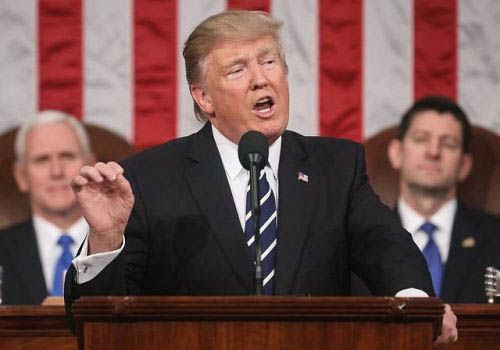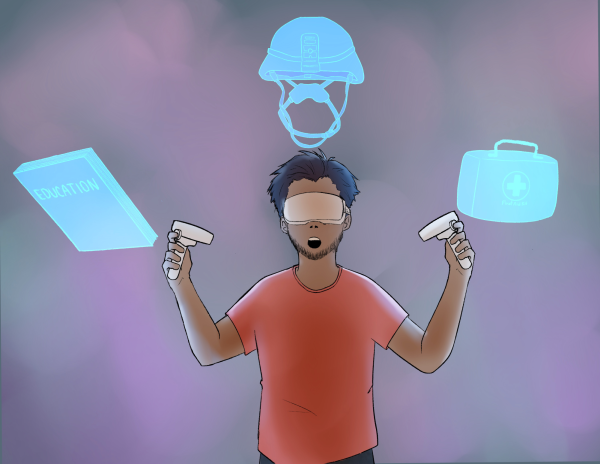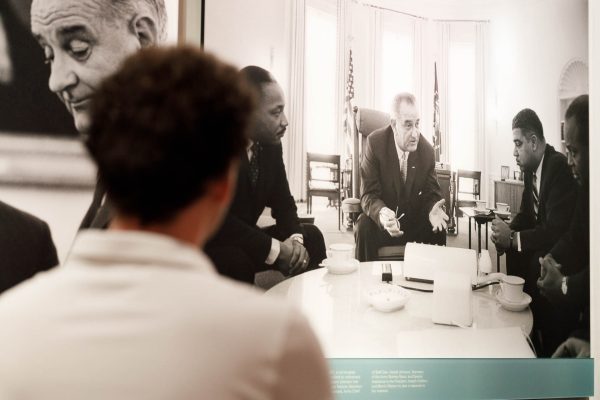OURVIEW: Trump transparently promotes American Nationalism in 2018 State of the Union

The State of the Union took place Jan 30, and overall focused on American patriotism.
Each week the editorial board reflects on a current issue in Our View. The position taken does not reflect the opinions of everyone on the Hilltop Views staff. This week’s editorial board is composed of Viewpoints Editor Lauren Sanchez and writer Collin Mims.
President Donald Trump gave his first State of the Union this past Tuesday, January 30, to a mixed public reaction. On one hand, it’s a very pretty speech, one which focuses on the achievements of the Trump administration, the growths born out of policy and the individual stories of everyday Americans, which added a grassroots, homegrown element to the speech that so much of his current political sphere has been lacking. So yeah, it’s a rather pretty speech, with a lot of platitudes, a lot of romantic notions and a lot of underlying notions of American nationalism.
That being said, the speech is more transparent than a pane of glass. A lot of the rhetoric used obviously does not belong to Trump himself, which isn’t inherently bad in itself. After all, presidents have speech writers, that’s natural for the political sphere. However, the rhetoric is blatantly and aggressively nationalistic, to the point where anyone with a modicum of critical thinking skills can see the underlying message within the speech: America is the greatest and if you don’t believe so, you’re un-American.
This is most readily seen in the narrative emphasis Trump places on certain ideals, particularly a reverence for the military, a trust in police and a blind adherence to the United States. The first of these is most readily seen in a story about Preston Sharp, a 12 year old boy who organized to make sure that the graves of 40,000 veterans all had flags on their graves for Veteran’s Day.
He also makes especial point to thank various service members that are in attendance, which further emphasizes Trump’s concerns with the military. He does the same thing with police, taking effort to thank the police and other law enforcers in attendance and commenting on their various deeds, including Special Agent Celestino Martinez, who serves currently as a member of ICE. Combined with a vague, shady allusion to the NFL protests and the refusal to stand for the National Anthem, Trump’s State of the Union ultimately insists that we have to completely adhere to blind nationalism and control if we are to be truly patriotic.
We’ve seen this use of blind patriotism in the past with former President George W. Bush. After the events of 9/11, he had the American people convinced that if you were not pro-him, you weren’t pro-America. If you weren’t pro-American, you were automatically a terrorist. This led to many media and news outlets refusing to speak out against him for fear of the consequences that doing so would entail. Similarly, Trump went as far to say that Democrats who remained silent during the State of the Union were “treasonous” and “un-American.”
There’s nothing wrong with being patriotic; a love for one’s country is an admirable thing. However, blind nationalism is inherently dangerous. We must be able to think critically about the issues that plague our nation and actively work to alleviate them, which is something that cannot come about if we simply keep telling ourselves we’re so darn great. America has a lot to improve upon and we need to be patriotic enough to admit that.











